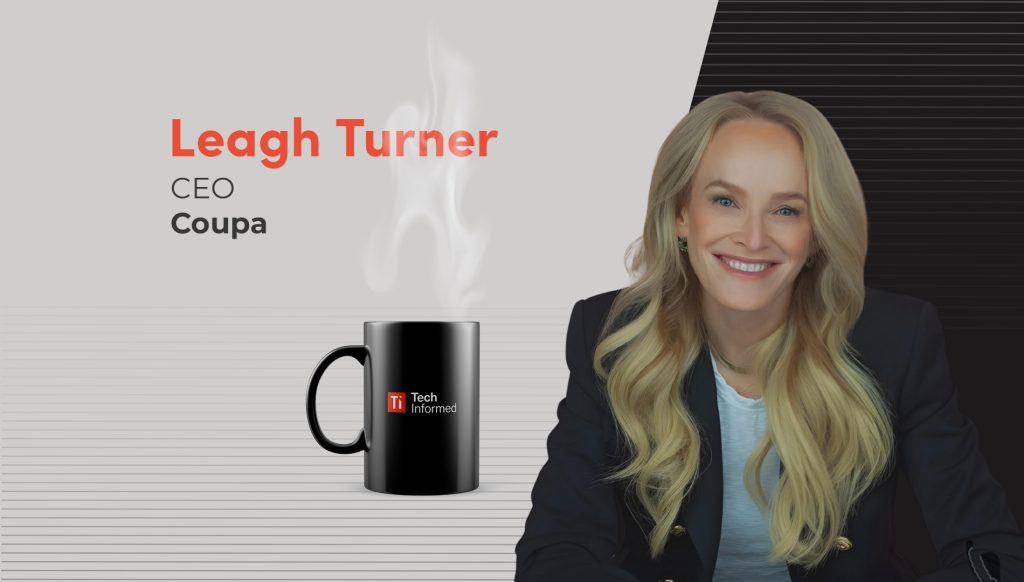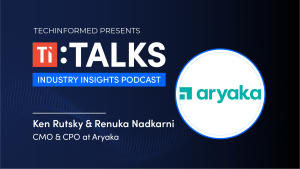

Leagh Turner, CEO, Coupa
“Talk to me about what’s going on out there—you’ve been to more trade shows than me…” says Leagh Turner, CEO of procurement giant Coupa. Bright, curious, and instantly engaging, it takes a good ten minutes…
“Talk to me about what’s going on out there—you’ve been to more trade shows than me…” says Leagh Turner, CEO of procurement giant Coupa.
Bright, curious, and instantly engaging, it takes a good ten minutes before I get to ask her a single question. Turner flips the script early on, peppering me with queries: “What were the main topics at London Tech Week? Talk to me about the requisite skill sets people are training robots to do…”
We meet in London on a late June afternoon during the UK stop of Coupa Inspire’s World Tour, where customers including Deliveroo, Barclays, Nestlé, AB InBev, and Diageo are presenting.
The company recently crossed $1 billion in annual billings and manages more than $5 trillion in global business spend through its platform. It’s no small feat—and the next phase of growth looks set to stretch further into Europe and APAC.
Over coffee, I finally manage to turn the spotlight back onto Turner. She talks candidly about geopolitics, generative AI, tariffs, and scaling in a complex world. She also shares how a simple pair of yellow sandals inspired her to encourage people to bring their “whole selves” to work.
You’ve said you had the “Forrest Gump” of careers, having worked across Xerox, Oracle, SAP, Ceridian, and now Coupa. How has that journey shaped your leadership?
I started as a classic salesperson at Xerox, selling photocopiers and fax machines. Then came Oracle during the Y2K rush, and later 12 great years at SAP, where I ended up running a global business north of $1 billion. I also co-led a public tech company through the 2016–2018 boom—and the correction that followed, where profitability became key.
Coupa fits that story too: it scaled fast, then went private to reset and grow more sustainably. I’ve been fortunate to work with great people at every step. That’s what keeps me engaged—smart, hardworking teams.
In terms of leadership, it’s about loving what you do and staying deeply curious about your customers. I’ve had seven or eight customer conversations today alone, and they’re all focused on the same things: simplifying their tech stack, figuring out how AI can help, retraining teams, and sourcing more efficiently. Helping solve those problems is the best part of the job.
How are recent tariff changes, particularly those disrupting North American trade agreements, impacting your customers—and how does Coupa help them respond?
One of our customers, Vale Metals, a division of the global mining company Vale, shared how recent changes to trade agreements—like the shift from NAFTA to USMCA—have disrupted their supply chain. For decades, they relied on tariff-free trade across North and Central America. Now, that model no longer works.
They used to move goods tariff-free from Panama through the US to Canada. That’s no longer viable, so they’re having to rethink everything: where they source materials, how they ship them, and at what cost.
Coupa helps by enabling dynamic supply chain modelling. We allow them to scenario plan—testing different sourcing and distribution strategies in real time—so they can adapt quickly and stay resilient in a volatile trade environment.
How is Coupa using AI and other technologies to help customers respond to those global trade changes and supply chain disruptions?
We invest heavily in product and technology—12–19% of our top-line revenue each quarter, which is well above the industry average. A big part of that investment goes into AI, powered by something unique to Coupa: access to nearly 19 years of structured, anonymised transaction data across our platform.
From the beginning, Coupa secured data rights in customer contracts, allowing us to aggregate and anonymise every transaction—who bought what, from whom, at what price, under which regulations. That’s over $8 trillion in transaction data, forming the foundation for what we call ‘Community Intelligence’.
Because AI is only as good as the data it’s trained on, this gives us a huge advantage. We use that data to train models that surface real-time sourcing recommendations, help customers scenario plan, and navigate changes like tariffs or regulatory shifts. With over 10 million suppliers and 3,200 global customers, our platform acts like a living network—constantly learning and helping customers adapt faster, with less manual effort.
Do you see a new branch of “tariff tech” emerging from recent global trade shifts—especially with technologies that were originally built for ESG or supply chain monitoring?
Funny you say, “tariff tech”—someone told me today they used to call it ESG, but now it’s “tariff-avoidance sourcing.” And it’s true—the same technologies apply. Whether you’re tracking emissions or avoiding tariffs, it all comes down to smart supply planning: knowing your suppliers, your distribution network, your buyers, your margins, and your risk profile—whether that risk is economic, regulatory, or environmental.
Are ‘Trump’s Tariffs’ good for tech?
We are seeing increased demand for this kind of insight. The conversations haven’t changed much—just the language. And with geopolitical shifts disrupting trade flows, more companies are realising they can’t rely on manual processes anymore. They need intelligent, automated systems to adapt quickly. That’s exactly where we come in.
Are procurement leaders becoming more visible and strategic within organisations? Is the CPO starting to have a seat at the board level?
Absolutely. Procurement is becoming a strategic function, especially as global trade disruption forces companies to rethink long-standing supplier relationships. When a key supplier suddenly becomes unviable, the person who can pivot quickly and rebuild that supply chain is the procurement officer.
It’s not just about cost anymore—it’s about business continuity and resilience. I spoke with a customer today who has 1,600 people in procurement and believes they only need 600 going forward. That’s 1,000 people they could redeploy to higher-value roles. We’re seeing this across the board: procurement becoming smarter, leaner, and more central to business strategy.
Coupa has passed $1 billion in annual billings and now manages over $5 trillion in spend. How are you thinking about the next phase of growth while staying true to your mission of making every dollar matter?
We’ll end the year with around $1.2 billion in revenue, growing at solid double-digit rates and operating very profitably—about 40% adjusted. We’re backed by a single primary shareholder, which gives us agility and speed in decision-making.
What’s next? At this scale, there are only two outcomes. The company can’t stay private forever. While an acquisition is possible, there are very few software companies in the world that could afford to absorb a business of this size—even giants like Salesforce or Microsoft would find it challenging. So, the more likely path is returning to the public markets.
To get there, we need to operate with predictability—quarter in, quarter out. That means doing what our own customers do: scale strategically, automate where possible, reduce manual work, and build long-term, repeatable processes. That’s the focus now.
Which regions are driving Coupa’s growth right now?
Geographically, North America still represents about 65–70% of our revenue, but that share is shrinking as we grow rapidly in EMEA and APAC. That’s why we’re on the road with Coupa Inspire—we were in Frankfurt recently, now in London, and heading to Tokyo next. The global momentum is very real.
You’ve championed the idea of people “showing up as their whole selves.” What does that mean to you?
Years ago, I wore a pair of bright yellow high heels to work, and someone I deeply respect said, “Leagh, you’re already a woman in tech—maybe that’s one ‘weird’ thing too many.” And at the time, they weren’t wrong. I’ve been in this industry for over 30 years, and back then, it did feel like standing out came with risk.
But over the past two decades, we’ve learned that companies are stronger when they’re more diverse—not just in representation, but in how people think. When you create space for different perspectives, for friction and challenge, you get better ideas and better outcomes for customers.

Leagh’s hot beverage of choice: Oat milk Chai latte
At Coupa, that’s something we care deeply about. If people feel free to show up exactly as they are, bringing their full selves and unique backgrounds to the table, we’re better equipped to serve a diverse, global customer base.
What do you do to switch off from work?
Two ways. Spending time with family and getting out for a good, long run. Both are super recharging for me.
And finally, how do you take your coffee?
With a bit of milk… or if we’re getting fancy, a hot oat milk Chai Latte.









